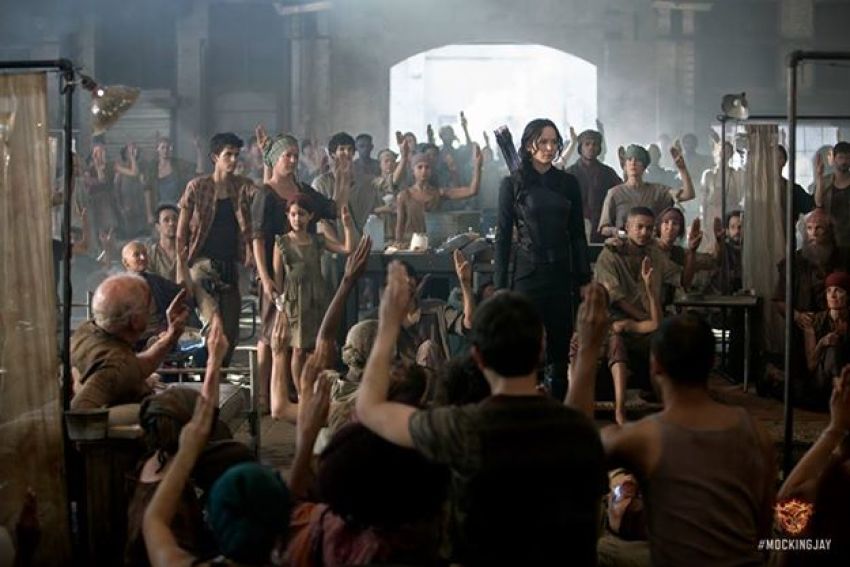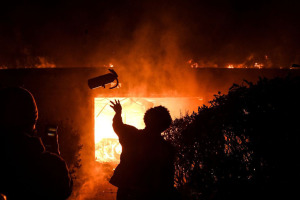Virtual Violence: The 'Hunger Games', 'The Lorax' and Post-Parkland School Reality

Somewhere between London Heathrow and O'Hare airports I began watching "The Hunger Games". I wasn't hungry. My seatbelt kept me from bolting through the overhead bin as I squirmed like a greased pig at the State Fair.
Kids killing kids—central to the movie's plot—should always make one squeamish. Watching a grown man sweating in the fetal position likely makes one nervous as well. On the eve of the Olympics my stomach was far from gold medal contention.
When the stewardess asked, "Mr. Pattengale, Would you care for more water?" I felt like responding – "Just pour it over me!" The fictitious killing of kids (especially with a family of precious cargo—kids—in front of me) was too morbid to digest. I turned it off.
If we collectively become insensitive to infanticide, then perhaps we'll give evidence of evolution from one species to another. God never created such a being. No matter how bleak, there's always a barometer among our kind against banality. In Sodom and Gomorrah there was Lot and his family. A Bonhoeffer in Nazi Germany. A Menno Simons among radical Anabaptists in Munster. A Wilberforce amongst slave traders. A Shuttlesworth leading the shunned in Birmingham. A human shield during the Parkland, Florida shootings--football coach Aaron Sheis. In post-genocide Rwanda, Pastor Charles Mugisha restoring communities via Africa New Life, and Rick Warren's Peace Plan systematically bringing diverse leaders to the same table. There's hope, as outlined in Rwanda, Inc. and Land of Second Chances.
With its creative plot reminiscent of The Lord of the Flies, "The Hunger Games" and its sequels are now in dozens of languages. With $700 million at the box office, its three sequels over two billion dollars, the storyline is a verifiable hit. And it indeed hit me in seat 8B; I soon became the hunted.In a sense, we all become the prey upon engaging such well-crafted stories about the human condition. The mesmerizing aspect of the likes of "The Hunger Games" demonstrates that good fiction captures the factual. That for every "Hunger Games'" plot, there's a historically-probable Blood Diamond episode. For every "Avatar" pogrom there's a real Rwanda.
Like "Avatar's" plot, in "Hunger Games" the contrast between hunter and prey is stark. One has all the technology and power, the other simple subsistence. And like "Shrek", there's a kingdom with opulence contrasted with a mass of survivors in a simplified state of being. But unlike the "Matrix", the oppressed were all too aware of their overlords.
Perhaps the saddest of comparisons is that like "The Dark Knight", even kids can grow numb to carnage. Call it the "Batman Syndrome" when moral numbness overtakes noble barometers we all need. Society surely depends on them. Civility devoid of the certainty of justice is incivility at best, and insidious at the least. The rallies after the Parkland massacre call for this, some for more gun protection, others for more gun control, but all for justice. While the debate rages on between the White House and Entertainment Software Association, Zenimax and Take Two Interactive over "virtual violence" in video games, students at Miami's Cushman School are throwing away their violent games to protest virtual violence after the Parkland shootings. Kids voting with their feet are having a much easier time than gaming experts endorsing the findings of the American Academy of Pediatrics, "Virtual Violence" (Pediatrics 2016;138(1):e20161298).
On the same trip, just a day after the "Batman massacre" in Aurora, Colorado theater (July 20, 2012), The Dark Knight was a feature on regular TV in the hotel room (the prequel movie of that premiering during the shootings). During the opening bank scene when Heath Ledger pulls off his mask after his orchestrated slaughter, I realized the implications of this fictional work. The sadness it invoked in me. The reality of a Stephen King societal filter we've come to accept. I turned it off and resorted to reading more wholesome things—which could have been about anything. Even Bill Maher would have been less destructive.
During the tumultuous decline of the Roman Empire, crowds booed plays if they lacked sordid realism, but applauded the blood and guts of realistic torture. To quench this lurking evil they began inserting prisoners into roles that led to dismemberment and death on stage. Real screams. Real blood. The bloodthirsty patrons not only approved, but called for more. From the ancient Olympics' Pankration to today's Mixed Martial Arts (cage fighting), part of our species has been enamored with muscular violence. Not surprisingly, the author of The Hunger Games, Suzanne Collins, drew some of her inspiration from the gladiatorial games and the Greco-Roman classics. And part from merging reality TV gameshows with news footage of the Iraqi War.
America is becoming bloodthirsty. Half of our electorate may vote against hawkish Republicans, but film viewing numbers and book sales suggest that across the electorate Americans vote for violence with their remotes and downloads. They choose a smorgasbord of vampire movies that make a feast of humans. A litany of horror films that show complex torture schemes. They pay more than the minimum hourly wage for ninety minutes of demonic scenes that will haunt their memories for decades. And, they tolerate kids killing kids—on film—and take their kids to watch.
Sadly, off screen kids do kill kids. The morbid website "Top 10 Young Killers" reminds us that we've imposed artificial barriers on the age of accountability. Believers in the goodness of humankind apart from God will have difficulty connecting those dots. "The Hunger Games" is a brilliant plot that hammers home the trajectory of human greed if left unchecked. Of nihilism taken to its extreme from its innocuous but tolerated beginnings. Of a society that rationalizes the degradation of its own. The 2018 Oscars share in this complex guilt, venerating an adult's illegal relations with a teenager—a disconnect Cheyenne Montgomery hammers in the Boston Globe, "'Call Me by Your Name' Is a Dishonest, Dangerous Film." He writes both from common sense and personal experience.
Yes, there are some teaching moments in controversial films, which seem to eclipse for many their theses. Wrapped in the "Hunger Games'" message are religious overtones, noted by Donald Brake (Washington Times) and others. From the self-sacrifice of Katniss, to hope, daily bread and Peeta Melark as a Christ figure, some critics find a redemptive story. But the plot still revolves around 12-18 year-old kids killing their peers. Some adolescent slayers seemed to enjoy it. Others hated it and its creators—from the opulent and fictional Capitol of Panem ("bread").
I finished this article during my trip back to London from Chicago, two weeks after writing the opening line. The "Hunger Games" was still available among "New Releases," but I couldn't bring myself to click and finish it. I watched "The Lorax" instead. It still captures well the human condition, the tensions between greed and green, me and we, and it exalts the power of the will and well doing. Instead of kids killing kids, it's kids being kids; and once again warped adults leading the city.
Two lessons are particularly relevant in our understanding of the human condition. "The Lorax"—magical protector of the truffle trees—reminds Mr. Once-Ler that trees fall in the direction they lean, so "be careful which way you lean." The movie ends with a timely quote from the story's author, Dr. Seuss, "Unless someone like you cares a whole awful lot, it's not going to get better." Of course this applies not only to beautiful trees, but more importantly to youthful souls and those vying for their time, virtual and otherwise.
Jerry Pattengale is a prolific author and University Professor at Indiana Wesleyan University. Forthcoming books include: Is the Bible at Fault? How the Bible Has Been Misused to Cause Evil, Suffering and Bad Behavior (Worthy), The New [Ecumenical] Foxe's Book of Martyrs (Tyndale House), and The State of the Evangelical Mind (IVP). He holds various distinguished appointments and is on the board of Religion News Service.
*In the light of recent events, this article (originally published in 2012) is adapted to speak to the present.



























